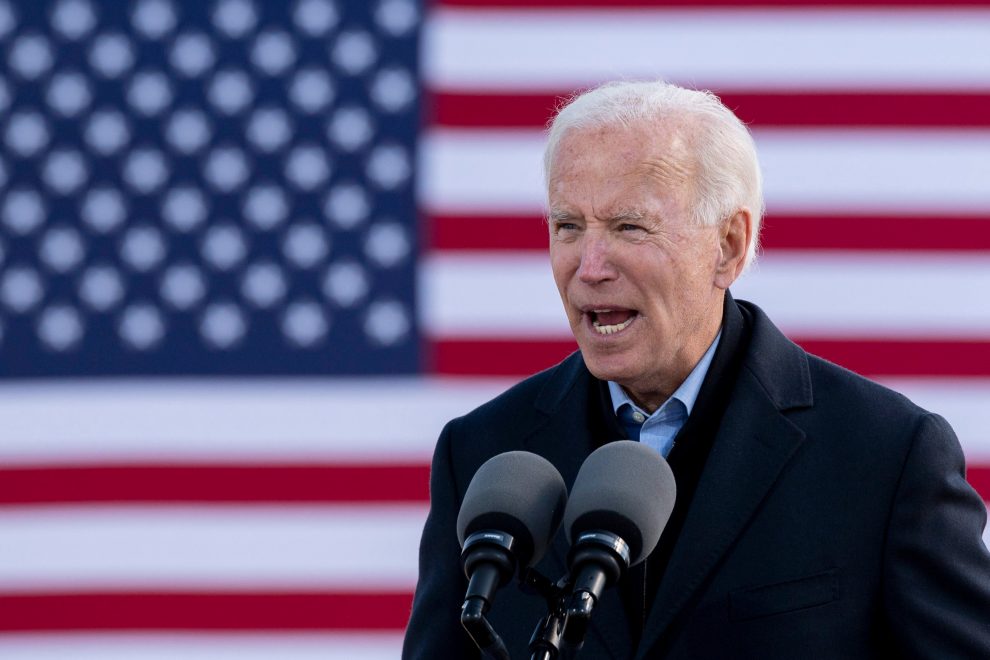Democratic presidential candidate Joe Biden’s economic proposals would increase federal spending by $11 trillion over the next 10 years, increasing the deficit and potentially leading the U.S. toward a debt crisis, experts said.
Vice President Joe Biden’s plans, ranging from health care and social security to climate and infrastructure, would far exceed projected tax increases, according to an October 2020 Manhattan Institute budget report. With tax revenue projected to increase by $3.6 trillion over ten years under Biden, his administration would oversee a deficit increase of $7.4 trillion by 2030.
“The policies he’s proposing are going to endanger the economy over the long term,” Brian Riedl, Manhattan Institute senior fellow and author of the report, told The Daily Caller News Foundation.
He continued: “$4 trillion in new taxes, which is the biggest tax increase since the end of World War II, as well as $11 trillion in new spending, certainly more regulation, a higher minimum wage. All of that is going to weaken the economy.”
The largest line item in Biden’s spending proposals is the $2.4 trillion Health and Economic Recovery Omnibus Emergency Solutions Act, the coronavirus stimulus package Democrats including House Speaker Nancy Pelosi have endorsed, according to Riedl’s report. Biden’s proposed $2 trillion climate and infrastructure initiative and $1.5 trillion health care expansion would also increase spending significantly.
Biden said in an Oct. 25 “60 Minutes” interview that raising corporate tax rates would pay for his plan to make state college free, according to The Annenberg Public Policy Center. Riedl estimated Biden’s college and post-secondary education plan would cost $750 billion.
“If we just made every corporation pay a minimum 15% tax, you got 91 pay no tax, that raises over $400 billion,” Biden said, according to The Annenberg Public Policy Center. “I can send every single qualified person to a four-year college in their state for $150 billion. I can make sure every single person who qualifies for community college can go, and we still have a lot of money left over.”
The Biden campaign corrected the presidential candidate’s statement following the interview, admitting he significantly underestimated the cost of his free college plan, The Annenberg Public Policy Center reported.
Riedl estimated Biden’s ten-year spending using figures projected by Biden’s campaign website, the Committee for a Responsible Federal Budget and the Congressional Budget Office. Brookings Institution and Urban Institute projected a tax revenue increase estimate similar to the one used by Riedl.
“The longer term plan of Biden’s would increase spending quite a bit and he’s not raising enough revenue to totally offset the new spending,” American Enterprise Institute (AEI) resident fellow Kyle Pomerleau told the DCNF.
Pomerleau said the $11 trillion spending projection is a “broad understanding” of Biden’s proposals, adding that spending could come in lower. He also projected Biden’s tax plan to raise $2.8 trillion over 10 years, less than the projection Riedl cited, in an AEI report published on Oct. 13.
Both Riedl and Pomerleau warned that the U.S. will need to reckon with the debt that it has been accumulating over the past two decades whether Biden’s policies are enacted or not. The federal debt was $27.2 trillion as of Sunday, according to the U.S. Debt Clock.
“It’s absolutely unsustainable,” Riedl told the DCNF. “The danger is that eventually the interest costs will bury us. When you borrow that much money, all it takes is a small increase in interest rates to completely bury the federal budget.”
The Congressional Budget Office has projected that the U.S. will borrow $104 trillion over the next 30 years, according to Riedl. That estimation assumes no new spending and is based on projections of interest rates, which could increase.
“Regardless of whether Biden passes any of his policies and spending policies, the debt path of the U.S. government is, at least under current projections, unsustainable,” Pomerleau told the DCNF.
“At some point in the future, debt payments, or the accumulation of debt, could crowd out the economy,” Pomerleau continued. “Increasing the debt, whether it’s through tax cuts, or through spending increases, would accelerate that.”
The debt has increased about 36% since President Donald Trump was inaugurated in January 2017, according to The Balance. The deficit has stayed under $1 trillion every year during Trump’s presidency, but is projected to ballon to about $3.7 trillion in 2020 factoring in the impact of coronavirus.
“Ultimately, we’re going to face a reckoning that requires either significant reforms to programs like Social Security and Medicare, or a possible doubling of middle class taxes,” Riedl said. “There’s really no third option.”
“The worst case scenario is that politicians continue to pour gasoline on the fire by enacting even more spending, which just accelerates a debt crisis,” Riedl continued.
The Biden campaign did not immediately respond to request for comment.
Story cited here.
























